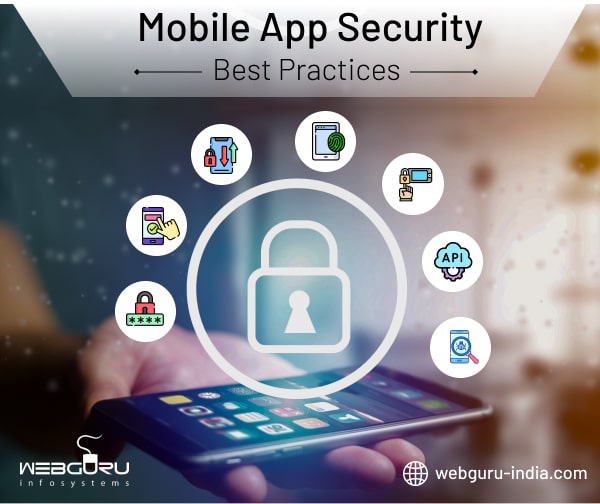Home Blog Mobile App Development Mobile App Security: Best Practices
Mobile App Security: Best Practices
- 02 Sep / 2021
- 2,570 views

With the rapid increase in cybercrime, security is no longer a feature in a mobile app. It is the bare minimum. Advanced features and high-end functionalities will not provide an out-of-the-box experience to your users if it fails to ensure their safety. Since most of the apps ask for access to the device features such as the gallery, location, and sensitive information like password, UPI/credit/debit card details, etc; a minor security breach will not only cost you bucks but ruin your reputation.
Here is a complete checklist of security best practices for your mobile app.
Proven Techniques to Enhance Mobile App Security
Write Secure Code
A code full of bugs and vulnerabilities allows the attackers to break in. The attackers can reverse engineer the code and tamper with it. A study by Infosecurity Magazine finds that malicious code affects over 11.6 million mobile devices at a certain point in time.
If you want to be an exception, start with a powerful code right from the beginning. For that, it’s always recommended that you engage professional mobile app development services. The developers will repeatedly test and fix bugs so as to minimize the risk.
Library Usage
It’s important to be extra careful and test the code thoroughly before using any third-party library in your app. While libraries are extremely useful, they can mess up your app security.
A single flaw in a library may enable the attackers to remotely install malicious code into an app and crash the entire system. Therefore, it’s better to use controlled internal repositories and follow policy controls during acquisition so as to protect the apps from vulnerabilities in a library.
Data Encryption
Every unit of data exchanged over your app should be encrypted. It is the process of converting data into coded information or ciphertext so as to protect its confidentiality.
The ciphertext can be decoded with a unique decryption key. Therefore, other than the authorized users, any third party can not decrypt stolen data.
High-End Authentication
Whether you are investing in Android or iOS app development services, it’s important to ensure that the app has a strong authentication system.
Authentication refers to various identifiers (password, biometric, etc.) that create a barrier before entering into a system. While app usage is becoming more seamless than ever, a layer of authentication can add to the security of the app. For instance, a strong alphanumeric password, dynamic OTP, fingerprint verification, retina scan, etc. can be used as powerful authentication systems.
Implement Cryptography Tools and Techniques
Key management is an essential element should you seek to enhance your app security. The experts of iOS and Android app development services suggest not to hard code the keys since it will make the attackers’ job easy.
It’s important to store keys in secure containers instead of storing them locally on the device. Also, you should use the latest and reliable APIs like 256-bit AES encryption along with SHA-256 for hashing.
Use Authorized APIs
Unauthorized APIs are loosely coded and can pose threats to an app. The hackers can enjoy a privilege and attack the app. For instance, caching authorization information locally can help programmers easily reuse information while making API calls. Thus, it makes the developers’ tasks easy.
On the flip side, the attackers can find a loophole in it and hack the system. Therefore, it’s better to use APIS that are centrally authorized so as to ensure maximum security.
You can take a look at this blog to find out how to build RESTful APIs for mobile apps.
Test Repeatedly
There’s no substitute for continuous testing. Repeated testing will help to find out new loopholes and deal with the emerging threats. Invest in emulators, threat modelling, and penetration testing so as to find out the vulnerabilities in your app. Fix these with each update and issue patches as required.
Further, if your app is built with outdated technology, it’s important to migrate to the latest technology. For example, if you have a cross-platform app built with Flutter, it’s time to hire Flutter developers and upgrade the app to Flutter 2.
Taking security as the fundamental element in app development is a necessity these days. And this trend will continue to grow with the rise of IoT in app development as it enhances connectivity and compatibility of an app with lots of devices. We hope that our guidelines have helped you to understand how to strengthen app security. Implement these and thank us later.
2 comments
Leave a Reply

-
1000+
Happy
Clients -
25+
Countries
Served -
19+
Years of
Trust









You seem to have good knowledge of technological trends. We will be looking forward to having more excellent communication with you.
I enjoy reading your site posts